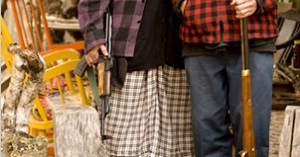ALL POINTS BULLETIN: Matt Hart to make Saturday worthwhile
Matt Hart, the genius author of Who’s Who Vivid and editor/publisher of the stellar Forklift, Ohio, will be appearing on The Joe Milford Poetry Show tomorrow, and I hope you will all tune in. Not only is Matt a great editor/publisher, and a fantastic poet, but he’s got a bar-none reading style that pretty much doubles the pleasure of what was already some of the best shit going these days. Don’t screw this one up.
November 14th, 2008 / 7:00 pm
Rauan Klassnik’s Ron Silliman Dreams

Silliman's eyes in Rauan's brain
In support of his excellent book of violent prose poems, Holy Land, Rauan Klassnik has been blogging from the Holy Land. There are lots of violent, strange drawings, weird rants, and recently, a series of dreams he’s had about Ron Silliman. They are quite fun.
Here’s the beginning of the first one:
I’m sitting on a rock with God. Below us in a field of cactus a naked Ron Silliman is scurrying after a rabbit.
Again and again it looks like Ron’s about to nab it but he either mistimes his final leap or the rabbit’s too slick and he ends up in cactus. Usually face-first.
But, a couple of times, tumbling over, it’s ass-first. All credit to Ron, though, he’s diligently and painstakingly removing all the needles (sometimes with the help of a mirror he’s produced from who knows where.)
I look over at God. He’s blank-faced.
Check out some more on the blog, and buy Rauan’s book. It is a quick and mind fucking read.
Wells Tower

Next March, Wells Tower will publish a book of short stories wuth FSG. So I will talk about Wells Tower now before it is too late.
I really like Wells Tower. I have come across maybe four short stories by Tower in the last five years. Fence. McSweeeney’s. A Public Space. This. His work seems to be leaking out very slowly.
Whenever a new New Yorker comes out, I open it up and check halway down the table of contents to see who wrote the story in the issue. Often it is Alice Munro. Quite often, really.
When that happens, I am just a little let down. Not because I dislike Alice Munro. Alice Munro is fine. Good, in fact. I eventually get around to reading the Alice Munro story, and often enjoy it. And now and again, I really enjoy it.
Sometimes it Yiyun Li, and that’s fine as well. Or Roddy Doyle. Or William Trevor. Or Stuart Dybek.
Lovely, one and all. But still, my heart sinks just a little.
This is why: I like short fiction because I like reading a lot of different people over shorter periods of time. I want more voices.
But, hell. Who am I to tell The New Yorker how to pick their fiction.
Hey! Last issue, Wells Tower. Go read it. Great stuff. (And then find “Everything Ravaged, Everything Burned.” It’s in that Ben Marcus Anchor Anthology.)
Here’s something to admire about the story: he manages the second person (a narrator who refers to “you” instead of “I” or “he”). A lot of people fuck that narrator up because they figure “you” means “you” instead of “you” means “me trying not to talk about me by pretending to talk about you.”
*This’ll be Blake in a few years

I don’t know if you’ve read The Beans of Egypt Maine. I did—years ago. And I really liked it.
I remember reading something about it, forgetting the title, and then accidentally buying (and reading) that Dorothy Allison book instead. (Yeesh.)
A couple of years later, though, I found the real deal. I remember it being a bit bleak, but the language was strong and straight ahead. Good sentences.
There’s a really good article about Chute in The New York Times.
That’s her holding what looks like an AK-47. Her husband is a sculptor who never learned how to read. (Also, if you look closely at the photo of the two of them, he kind of looks younger than his giant gray beard suggests. It’s his eyes.) They have an anti-corporate militia. She still writes on a typewriter. They have a sign on their property that suggests one stay away: “Woa. Visitors Turn Back.”
They also have a bunch of Scottish Terriers. I don’t know why, but that strikes me as the weirdest part of the story.
i took the two and smashed them together until they became a solid piece of total beauty
Today at Dennis Cooper’s Den of Awesome, we learn all about the poet Steve Richmond.
Hey
Hey, I woke up today!
And there was the sun again
shooting in through the shades
and spearing me in the eye!
And the clock! Still alive!
and the rug was not on fire!
and the lawn! The trees! The gutter!
All there! Once again!
Today!
Black Kids in Lemon Trees

I will write something about the other two ML Press books soon. I received them yesterday—simple design, simply made, good job J.A.—and enjoyed all three.
I’ll start with Black Kids in Lemon Trees by HTMLGiant’s Shane Jones. I’m a big fan of Shane’s writing. I am happy to cop to that. Shane is one of only two people I have let take over The Man Who Couldn’t Blog when I asked him if I could put an excerpt from his book Light Boxes on the site. So there’s that.
This almost seems unfair. It’s apparently already sold out. So you, dear reader, can’t go get a copy for yourself. But I want you to. That’s what I am here to say. It’s very, very good.
In 25 little sections, BKILT follows this wonderful thread of dream logic. Shane does surrealism about as well as one can and still make a readable story on a page. Police in the clouds, cop eyes, shooting at the sun, kids in dayglo shorts throwing lemons at the clouds—the images are so strong, so neatly and quickly rendered. And they all gather together well like cogs in a watch. Or, not a watch. Some sort of mechanism. The function of the mechanism may not make perfect sense, but the gears fit against one another, and the machine has an internal integrity.
There was a nice Believer article about how to read a Russell Edson poem. You can read it all here. That article has been very helpful for me when approaching work like Shane’s.
Nice job, Shane. Sorry, people who don’t have a copy on the way or in their hands.
Thus spoke Pink, a review

When first encountering Sam Pink’s writing, one may be tempted to dismiss it, as I did, as adolescent misanthropy seasoned with Asperger’s syndrome. It’s hard to get past the graphic violence and misogyny. Though, if there is such a thing as an open mind, on a good day I think I have one, so I asked Sam to send me Yum Yum I Can’t Wait to Die, which he did.
I was immediately struck by how such dense ideas could be evoked/initiated by such simple and direct language. His writing is quite philosophical, yet not in some alienating solipsist way. I found myself re-reading sentences, trying to get my head around certain turns of phrases or concepts. He has a riddle-like way of saying things. Around the seventh page, I said to myself, “This is guy is fucking Nietzsche.” Both of them are able to get to truth while sounding like an asshole.
Yum Yum I Can’t Wait to Die is comprised of little aphorisms and modern pedestrian allegories, of a guy who is, well, completely fucked in the head. This may not be the most original motif, but Pink is less interested in his narrator, and more so on ideas. It’s a mixed bag of philosophy, hilarity, and rare moments of genuine sadness—made striking by Pink’s unlikely empathy. He speaks of a timeless omnipresent wind outlasting all of us; his dog protecting unbaptized babies in purgatory; leaves and twigs distorting the surface of a puddle, spraying the moon with blood, and so on. Each part is a violent haiku. And there are moments of stunning loneliness, marked by self-effacing irony:
Today a telemarketer called and I said, “Please don’t hang up on me. Please.”
Of course, before we start thinking this guy is Basho or Issa, he offers this:
I want to blow my head off with a shotgun, into the open birth canal of whatever pop star is currently cool, so she has to menstruate my splattered skull and brains.
Such hyperbolic violence is either rhetorical device, or Pink is truly a little insane. I doubt Sam Pink is actually his name. I imagine a guy whose snorted his own semen for material (pun intended). The object of his ‘ambivalent’ (to put it lightly) affection is an unnamed and vaguely implied girl, and one forgets the philosophy and realizes that this is just some lonely loser. Maybe that’s why it’s so easy to jump into the narrator’s shoes. We’ve all been lonely, some of us still are. Pink’s words have a way to jumping inside you and moving organs around. To read him is to see things from a new inverted angle. He says, in my favorite line:
And when your mind is a field your tongue is a cloud.
Now my thoughts grow up-side-down towards a voiceless mouth. Thank you Sam Pink, you sick fuck.
The Ultimate Game Guide to Your Life®
 So, to let my secret yet rabid fanboyism spill forth like the frothy annoying bad-smelling liquid it is, I am ordering everyone who visits this site to buy Christopher Monks’ new book THE ULTIMATE GAME GUIDE TO YOUR LIFE®. I got it in the mail Monday, and it’s entertaining as fuck.
So, to let my secret yet rabid fanboyism spill forth like the frothy annoying bad-smelling liquid it is, I am ordering everyone who visits this site to buy Christopher Monks’ new book THE ULTIMATE GAME GUIDE TO YOUR LIFE®. I got it in the mail Monday, and it’s entertaining as fuck.
If you’re ever looked at a video game guide, and wondered if someone could write the same thing for your life, and you’re a white male living in America, without cystic fibrosis, this is the fruition of that idea. The book is even better than I imagined that one time I was in line at Gamestop buying the guide for Metroid Prime with my mother’s credit card. Also, not as depressing.
Today is the “Order My Book Extravaganza!” and if you’ve got the Alexander Hamilton to blow, it’s easily worth the money. You’ll like the book way more than Alexander Hamilton. Unless you’re a Federalist. And in that case, fuck you. No way. No how. No Hamilton.
Go here to order.
Ander Monson’s electronic boatload
 If you’re a fan of Ander Monson (which, you should be: if you haven’t read, in particular, his story collection OTHER ELECTRICITIES, you are missing a hell of a book), then you may or may not know about Ander’s personal website based around his books, which in the case of the last two releases in particular is a host of a whole slew of amazing and weird unreleased texts from Ander’s diagrammatic brain.
If you’re a fan of Ander Monson (which, you should be: if you haven’t read, in particular, his story collection OTHER ELECTRICITIES, you are missing a hell of a book), then you may or may not know about Ander’s personal website based around his books, which in the case of the last two releases in particular is a host of a whole slew of amazing and weird unreleased texts from Ander’s diagrammatic brain.
The Apocrypha section of the Other Electricities section of the site (yeah, each layer is layered more and more deeply often, and the NECK DEEP section often seems a maze of its own ilk), has a ton of lists, letters, and other deleted scenes material, much of which like what you might find on Ander’s DIAGRAM.
It’s a good place to get lost and a good model for authors wanting to make their own websites things people will actually want to look at and come back to.



 I think changing publishers before a book comes out is kind of interesting. Well, it adds drama. For the writer, it poses an interesting dilemma. You have to kind of feel that one press is better than the other, but you already accepted with the one press so why did you send it anyway? Brandon Scott Gorrell faced a situation where he had accepted with Greying Ghost Press but when Tao Lin decided to start his own press, Brandon backed out and went with Tao. Not a surprise. I think most of us would have done the same thing, or maybe not.
I think changing publishers before a book comes out is kind of interesting. Well, it adds drama. For the writer, it poses an interesting dilemma. You have to kind of feel that one press is better than the other, but you already accepted with the one press so why did you send it anyway? Brandon Scott Gorrell faced a situation where he had accepted with Greying Ghost Press but when Tao Lin decided to start his own press, Brandon backed out and went with Tao. Not a surprise. I think most of us would have done the same thing, or maybe not.